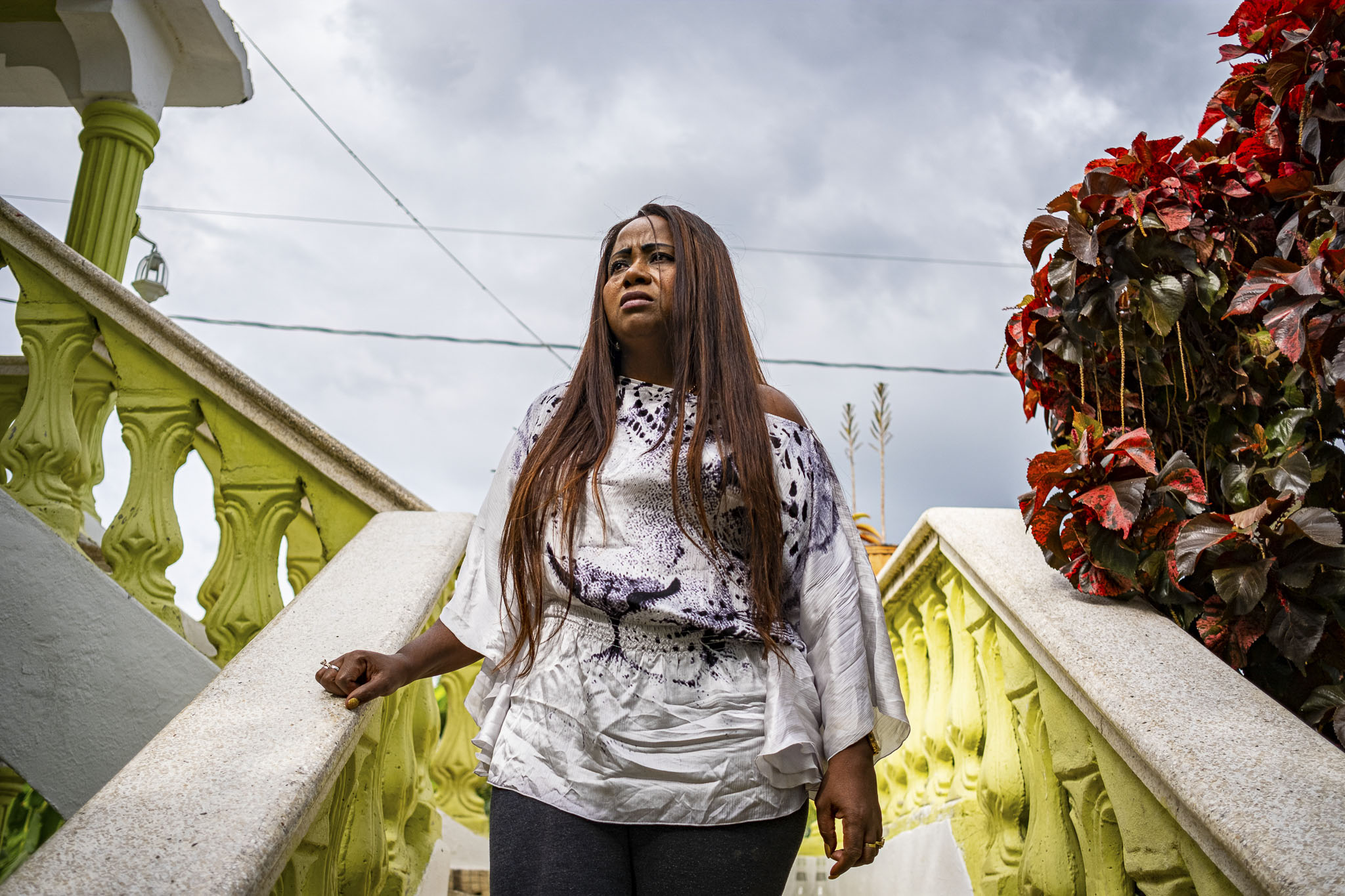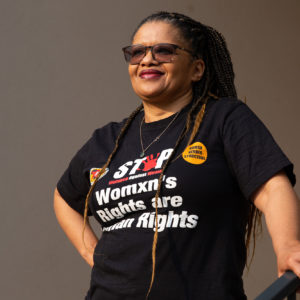Sex worker turned congresswoman opens new horizons
Jacqueline Montero became the first sex worker in the Dominican Republic to earn a seat in Congress in 2016. She reflects on facing discrimination and campaigning for women’s rights.
Author:
30 September 2021

Jacqueline Montero, 51, was the first sex worker turned diputada, or congresswoman, in the Dominican Republic. She remembers her groundbreaking campaign in 2016.
“I was speaking at a rally and there was a man in the crowd who I recognised from my years as a sex worker,” says Montero. She speaks Spanish on the terrace of her home in Bajos de Haina, an impoverished port city south of the capital, Santo Domingo.
Related article:
“I heard the man say, ‘When she starts to talk I’m going to shame her and tell everyone who she really is.’ So I told the crowd, loud and clear: ‘I come from sex work, and this is my power. This is not a weakness,’” Montero says.
Montero’s daring political campaign in Bajos de Haina rattled the halls of Congress, proving to the thousands of sex workers in the country that they could be represented in some of the most powerful positions in the country.
“I [wanted] to show other women that we [had] potential and we [could] dream beyond this life of sex work,” says Montero.
Doing sex work for food
According to Montero, there are at least 200 000 sex workers on the small island nation, which has a population of about 10.8 million. The country attracts millions of tourists each year to its pristine beaches and luxury resorts. It is also a major hub for sex tourism.
Sex work in the country is neither explicitly prohibited nor legalised. The country’s police force mostly considers the practice lawful, but the lack of legal protection often leaves sex workers vulnerable to abuse from both clients and police officers.
In the Dominican Republic, the Spanish word cuero, which means “leather”, is commonly used as a derogatory term for a sex worker. “Many years ago, women in the Dominican Republic would engage in sex work for food in the villages because a lot of them had children without a husband or their husbands had died or left them to go work in the city,” Montero says.
Related article:
“In the countryside, the mattresses were made from dry plantain leaves. When people were having sex on the mattress, it would make a ‘shh, shh, shh’ sound,” she says. “The women didn’t want the rest of the community to know they were having sex, so they started making their mattresses out of cow leather. Then the men started to say, ‘Let’s go to the cueros’ when they wanted sex.”
“It all started with getting plantains, bananas and other food,” she continues, glancing intermittently at her cellphone, which vibrates constantly with messages and calls. “But it goes up to the women who use sex for new cars or apartments. It’s all the same. Here they don’t discriminate against sex work. They discriminate against poverty. Because the ones who give their bodies for apartments or TV shows are glorified. But the ones who are doing the same but are poor are demonised.”
Montero was not always this confident. Her journey is fraught with abuse, pain, struggle and resilience.
The key to freedom
Montero was sexually abused for years as a child and at 16 she married a man who routinely beat her. Her family refused to intervene. “My family said that my marriage life was not their problem,” Montero says. “So I was forced to go back to him all the time. The abuse got so bad that I was worried he was going to kill me.”
Montero had a longtime friend who was already engaged in sex work. The friend encouraged her to go with her to the city of Baní, 65km south of the capital, promising Montero that she could make her own money and no longer have to depend on her husband.
At the first brothel where Montero worked, the owner gave her a key to her own room. She was 17. “I felt like that key was my key to freedom,” she remembers. “Freedom is all I ever wanted in my life.”
At first, the work “didn’t feel abusive”, Montero says. “It was either doing this or dying. So anything was better than dying. It was a way out for me.” But after some time, “I felt like I was being raped. I started to feel dirty. My friend said that feeling would fade over time. And then when it didn’t, she told me to try drinking.”
Related podcast:
Montero drowned herself in alcohol to cope with her life and continued with sex work for a decade. Clients beat and raped her and four men gang raped her. But, trapped in a life of poverty, she had no choice but to wake up each day and continue.
Montero was approached by someone from the Centro de Orientación e Investigación Integral, an organisation providing support for people living with HIV, sex workers and other disadvantaged groups, in 1991. She began attending the group’s meetings at the height of the HIV and Aids pandemic, which badly affected the Dominican sex worker community, and soon threw herself into the work. In just a few years, she became a leader in the group, travelling to Latin American countries to gather information from other sex workers.
“I started to learn more about what [sex workers] could do in terms of demanding rights,” Montero says. “Like rights to healthcare and rights to social protections and workers’ rights. This is when I started really feeling empowered.”
Montero, along with a collective of sex workers, founded the Movimiento de Mujeres Unidas (Modemu), an organisation consisting of current and former sex workers in the Dominican Republic, in 1996. According to Montero, Modemu became the only organisation in the country that not only fought for the rights of sex workers, but also worked to provide them opportunities to leave sex work.
Related article:
She became the president of Modemu, the organisation she continues to lead, in 2000. “The only way someone can leave sex work is if they are offered a job,” Montero says. “And for those who cannot find another job or do not want another job, their rights still need to be ensured and we need to find ways to make their lives easier.”
But Montero understood that to ensure the rights of sex workers and give them more opportunities in the country, there needed to be laws in place and the government had to be involved. “So I decided to enter politics,” she says.
She was elected to Bajos de Haina’s city council in 2010 and opened training centres to offer hundreds of sex workers classes in beauty, sewing and other trades. She was also able to secure government funding to offer sex workers microloans to open businesses.
Several years later, her work as a councillor in the city inspired her to challenge the trajectory of the Dominican Republic’s political history, and she began her campaign for a seat in the halls of Congress.
‘Sex work became my strength’
The Dominican Republic is a conservative country. The majority of the population is Roman Catholic. Sex workers face widespread stigma and discrimination. “I knew getting into Congress was going to be very hard for me,” says Montero, who ran with the Partido Revolucionario Moderno or Modern Revolutionary Party.
“For the religious people who I knew would speak badly about the life I come from, I would tell them that I know God. Now through God I’m helping other women get out of this life,” says Montero, who is Christian.
Like many in the Dominican Republic, Montero does not believe in abortion. She notes, however, that this is only her personal belief. She has shown some support in the past for the decriminalisation of abortion in the country. Over the years, Montero has adopted 16 children from sex workers who would have otherwise had abortions. She now has 19 children, aged one to 30. Three of them are her biological children.
This helped her collect votes from the conservative religious community in Bajos de Haina, while the many sex workers there also supported her. “My past as a sex worker became one of my greatest strengths in getting support from the communities,” Montero says.
Related article:
Her campaigning paid off, and she was elected diputada to represent part of Bajos de Haina in the 190-seat lower house of Congress, opening the country’s legislature to the voices of thousands of sex workers. “I felt so happy and empowered when I won,” Montero says. “It showed people what anyone could do if they believe in themselves and put their mind to it.”
But she was not immediately welcomed by her fellow diputados. “In the beginning, the other diputados acted like I didn’t belong there because they didn’t understand me and thought I was promoting prostitution,” Montero says. “If I sat down to eat with them, they would get up from the table and leave, and if I got on the elevator no one would get in with me.”
Eventually, her fellow legislators warmed up to her. According to Montero, during her four years in office, she helped submit 33 bills and projects to Congress, four of which passed. She also helped introduce a draft bill that would provide sex workers labour rights in the country, along with securing social security and medical insurance.
The changing landscape
The Covid-19 pandemic has severely affected sex workers. The government suspended commercial flights and tourism plummeted, while entertainment venues were shut down. There was also a night-time curfew, which ended recently and was typically from 7pm until 5am. This was a blow to the sex-work industry.
Montero says she was able to help get food from the government during this time for about 4 000 sex workers. She also secured medical insurance for about 5 000 sex workers.
Despite Montero’s trailblazing political career, she lost her seat as diputada after last year’s election. According to residents in Bajos de Haina, Montero lost a lot of local support during her time in Congress.
“All of us were very hopeful for her,” says Segundo Maldonado Abreu, a well-respected leader in the city and director of Casa De La Cultura De Haina, a group that celebrates culture, music and art. “She came from the most difficult life in Haina, so we all hoped she would do something different and really try to help the people [but] she forgot about the people and she focused only on her career as a diputada. She let everyone in Haina down. People here don’t support her anymore and she would not be able to win again.”
Related article:
Sergia Galván Ortega, one of the Dominican Republic’s most prominent feminist activists, says Montero’s political career was “dissapointing”, adding that she did not show enough support on some of the most important issues facing women in the country, such as the tres causales movement to decriminalise abortion.
“She’s coming from a life of social work with some of the most vulnerable women in the country,” Ortega says. “So I expected to see a lot more from her.”
Montero admits she failed to keep her seat in Congress because she lost the support of the community. She blames this on her work as a diputada physically taking her out of the city. Before 2016, “I was coming from years of intense grassroots community organising. But when you’re diputada, you’re organising in Congress and you’re farther away from the community.”
Despite the criticisms, Montero continues to be a source of inspiration for young sex workers who are able to imagine a different future. Several sex workers now plan to follow in Montero’s footsteps and run in the 2024 elections.
“We have to encourage sex workers to aspire for the highest political positions in this country because this is the only way our situation will truly change and get better,” Montero says.






